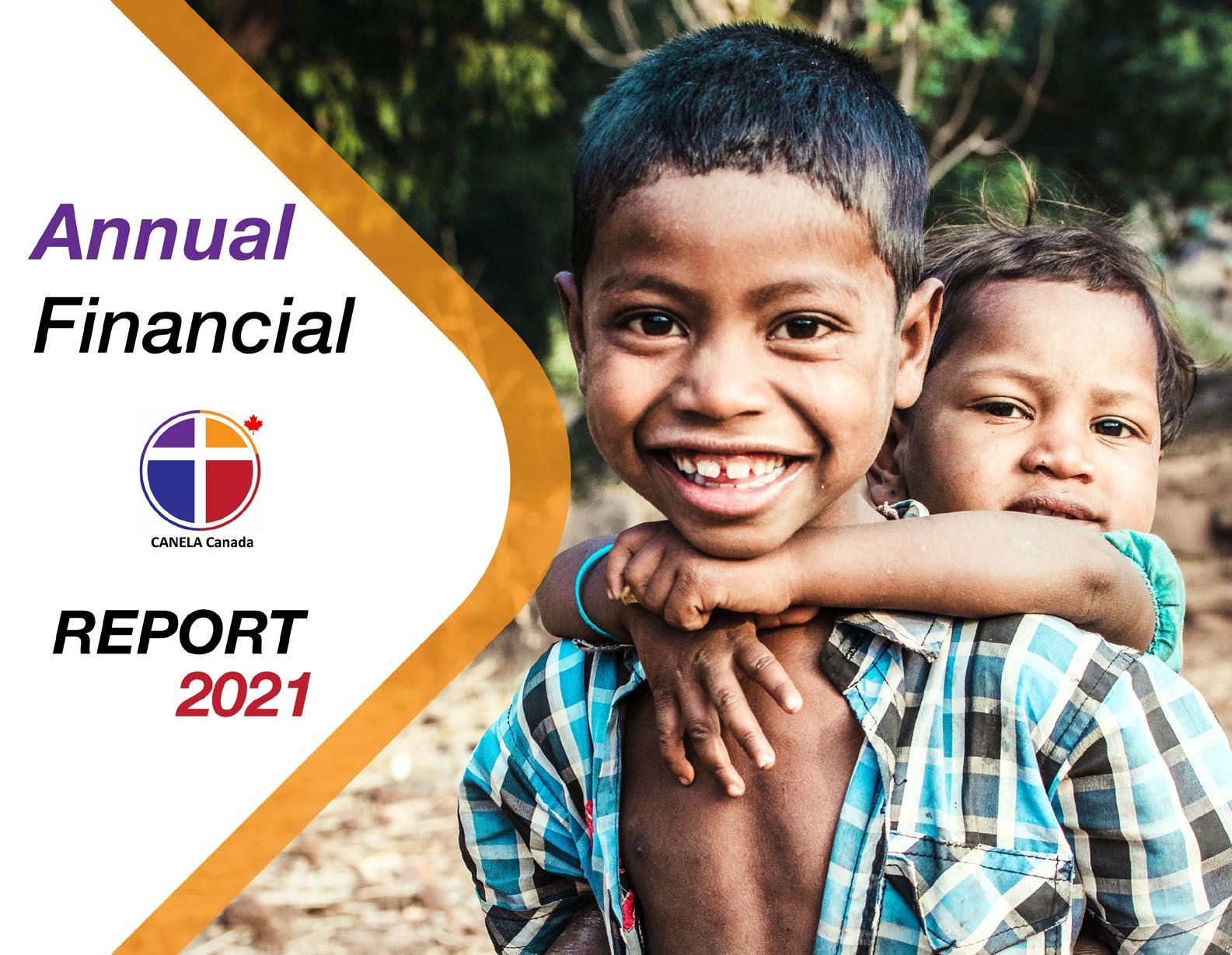










This is our second Annual Financial Report. CANELA Canada was basically born during the world pandemic, which has presented special challenges to our growth. Throughout 2021 it was virtually impossible to fundraise apart from electronic means, and that hit our finances. Donations were down from over $13,000 in 2020, to $8,500 in 2021 (a drop of almost 35%). We sincerely hope that 2022 will show a turnaround, and will work for that to happen.
We take advantage of this opportunity to remind you that we have a standing agreement with our sister foundation in the United States, CANELA USA. We regularly send a lump-sum to the US foundation and have them administer the grants as per the decisions of our Grants Committee. They do not charge us for this service. It works out to be much cheaper than if we were to do this ourselves. This is because in Canada, bank charges for transferring funds to foreign beneficiaries are prohibitively high. Furthermore, the banks don’t just charge high commissions: they also offer unfair exchange rates, so they cash-in twice! That is especially lethal for small grants: our $250/month grant to Father José Refugio in northern Mexico, for example, would cost us $280 to with charges and exchange rate, and Father would only receive $200 because of his own bank charges. By sending the money via our associate foundation in the US, we have reduced that cost to about $255, and Father José Refugio receives the full $250.
Special thanks to all of you who stuck with us over these difficult years. “A man of many companions may come to ruin, but there is a friend who sticks closer than a brother” (Proverbs 18:24).
With gratitude and prayers,
Father Robert Havens Board of Directors CANELA Canada
CANELA Canada
P.S. Please note: all figures for “Our numbers” given in CAD, all figures in “Statement of Activity” given in USD.
from the Board of Directors.Our mission is to help existing, well-proved educational projects of the Catholic Church to form spiritual and civic values on as large a scale as possible in Latin America and Africa. We have identified some very promising programs and try to focus on them, since they have been effective and enjoy the support of the dioceses involved.

[Jesus] answered: It is also written, Man lives not from bread alone, but from every word that comes from the mouth of God. (Matt:4) Because the Catholic Association for the New Evangelization in Latin America and Africa is convinced that the true salvation of the human person comes not from economic well-being alone, but from the discovery of a loving God by each and every human person.

Why
In the last fifty years, more than a trillion dollars in development aid has been sent by religious and secular organizations to Latin America and Africa. Often sent with great love and sacrifice, this material aid has done much good. Wells, electricity, hospitals and schools: all things that might not exist today, if this help had not been sent. And yet, despite all this important material help, crime, the loss of values, and the disappearance of cultures and traditions have grown in leaps and bounds in many countries.


In El Salvador, we support a program called “Full-Time Catechists”. This program seeks to form the capacities of lay persons in heavily-populated parishes. Generally, there is no lack of lay persons who would willingly lend a hand in the non-sacramental care of the parish: baptism preparation, confirmation, First Communion and marriage preparation, the coordination of youth ministry, ministry to the sick and elderly, coordination of the parish’s charitable activity, prison ministry, liturgy etc. etc.

There are two principle challenges to this sort of collaboration in our socio-economic contexts. First, even the most motivated lay persons often lack the know-how to help in these areas of pastoral care. Not just the pastoral application of the Faith, but also a knowledge of the Faith itself.
How many sacraments are there? What is the “Church”? What are all the areas of action that are NOT the exclusive domain of the clergy? What does the Church teach about marriage, and how can de facto situations be regularized for the good of all?

In many parts of Latin America, the clergy receive no regular salary and do not have health insurance. We try to contribute to this need for a few needy priests every year. In 2020, we also started a “Committee for Priests’ Welfare” which seeks to provide a reliable source of income for very poor priests.

With your help, the School of the Faith and Leadership has been growing rapidly throughout English-speaking Africa. This year we were able to send small contributions to the teams leading the different branches of the School, as well as provide long-distance technical Support via Internet. This was particularly vital due to the total closure of the schools’ presence-based classes during the pandemic.

The survival of the School of the Faith throughout Africa.
The lack of a reliable welfare state and the presence of endemic corruption mean that in many communities in Mexico, the Church becomes the main coordinator of humanitarian aid.

In 2021, we provided help to the dioceses of Durango and Tuxtla Gutierrez (in Chiapas), so that parishes could provide food and shelter for the destitute.

The Year in Numbers. (all figures in CAD)
Bank balance on 1st January 2021: $2925.59
Donations received 2021: $8592.09 (2020: 13,164.73)
Grants sent to CANELA USA for administration in the name of CANELA Canada during 2021: $9,000
Bank charges: $85
Bank balance on 31st December 2021: $2432.68
Statement of Activity % of Total Revenue | January - December 2021 Catholic Association for the New Evangelization in Latin America and Africa (CANELA)
